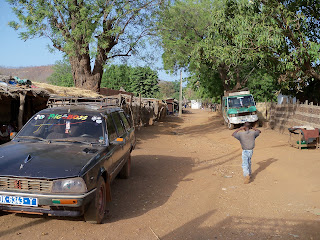All the PeaceCare team members and the PCVs took turns writing entries for the
PeaceCare Blog and this is the thing I wrote for my day.
Saturday Feb 4th 2012
PCV LaRocha
LaRiviere (ou bien Adama Souaré)
Today we woke up, greeted the family hosting us, and
unsuccessfully looked for bananas on my way over to breakfast at the Saraya
hospital’s housing area. We had an oatmeal can filled with village-style peanut
butter, a plastic sack of hard boiled eggs, and a big pile of fresh loaves of tapalapa, handmade village bread. The
water was on, so I sipped my instant coffee and filled our water barrels and watched
a big class of kids doing their stretching on the basketball courts. The water
went out after a little while, and the doctors headed over to the hospital for
rounds. A couple of the Peace Corps Volunteers worked on translating and
editing the team’s PowerPoint presentations, and there were a series of
meetings were we mostly talked about meeting we’ve had and arranging for more
meetings in the future.
Of course, it wouldn’t have been a day in Senegal without a
massive schedule disruption. Unfortunately, last night there were two serious
accidents involving multiple fatalities on the Kédougou road last night, and
all senior members of the Kédougou medical staff were working on that past six in
the morning. Obviously, getting on an early morning car to come to Saraya for a
day of training and discussion was not going to happen after that. We did our
best to salvage the day’s productivity, so we strolled over to the new Saraya
hospital to ogle all the shiny fancy new things that JICA (Japan’s
international development agency) has built and brought to Saraya. There were
so many pristine rooms and pieces of equipment - a maternity ward with
state-of-the-art birthing tables and little infant beds with sunlamps for
jaundiced babies; a pristine specimen collection room, with the little
wall-portal for passing cups back and forth; an operating room with brand new
basins, lamps, and tables, capable of accommodating Cesarean sections and other
surgeries; fancy facility maps with little red arrows declaring that VOUS ETES
ICI. Sadly, the hospital won’t be able to begin seeing patients until the
Senegalese Government finishes their contribution to the project, specifically
building living quarters for staff, a morgue building, a driveway, and a low
wall around the whole complex. It looks like construction’s starting on the
wall, or a trench has been partially dug, but it may be awhile before the
lovely new hospital is open for business.
After the tour wrapped up the group braved the mid-day sun
and walked back down the (amazing, smooth, lovely, evenly paved) road to the
current Saraya hospital. While we sat around waiting for lunch to be served
Amish taught us all the “Zoo” game, which basically involves a lot of clapping
and snorting and making funny animal gestures. Lunch was yassa sauce, made with diced onions, little bits of carrot, and
small chunks of meat (beef? or maybe mutton?), over steamed rice. It was pretty
good, but my favorite part, was the amazing selection of delicious juices.
There was sweet, dark red bissap (like hibiscus) juice, thick, creamy baobab
juice, light, spicy ginger juice, pale green kiwi nectar-ish ditakh juice, bissap with fresh mint, bissap mixed with
baobab, and Foster Clark’s Orange, which is basically really strong Tang.
(PHOTOS: Ivy and the juice)
After all the juice and yassa
I fell asleep for a bit, sitting up in the afternoon heat, and then spent
the rest of the afternoon translating stuff from English to French. My netbook’s
battery was running low, so I went inside the hospital’s living quarters to
plug in, and people were watching a TV show about people with extreme gigantism
and that disorder that makes children age horrifically rapidly. It was surreal
but entertaining background noise, and I wrapped up my form translation just in
time to watch Dr. Isaak Manga give a PowerPoint presentation on malaria in
Senegal. After the malaria talk Dr. Nate gave a presentation on EKGs and the
electrical goings-on of the heart. A lot of the jargon-heavy parts were alphabet
soup to me, but it was neat to have a heartbeat explained in detail. After the
EKG talk we headed over to dinner, which was lovely. They made the best thing,
which is meat and fries and salad with dressing and tomatoes, and also more
juice. After dinner we set up the projector and had a little outdoor screening
of Babies, which went over really well. We’d set up plastic chairs for all the
hospital staff, but when it was over and the lights came up we realized that
during the movie a decent sized crowd had gathered to look on. Everybody loves
babies!























.jpg)








